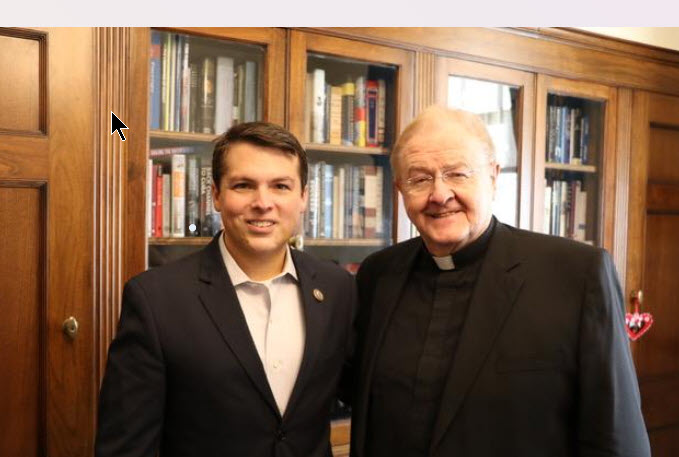FERMANAGH AND DONEGAL AGAINST ENGLAND’S AMNESTY
Posted By: October 06, 2021
Congressman Brendan Boyle (D-PA) and Fr. Sean Mc Manus. Capitol Hill.
CAPITOL HILL. Washington, DC. Wednesday, October 6. 2021— Donegal and Fermanagh, in a manner of speaking, have lined up together to oppose England’s amnesty.
The Irish National Caucus has inundated the United States Congress with its regular “Irish Congressional Briefings” and phone calls opposing the Amnesty proposals of Boris Johnson.
And Congressman Boyle (D-PA) took the lead in authoring a “Dear Colleague Letter, ” signed by 36 Members of Congress, and sent to the British Government.
Congressman Boyle’s father is from Donegal (“ the second-best county in Ireland,” as Fr. McManus says) and Fr. Mc Manus is from Fermanagh, from the ancient parish of Kinawley:’’ divided by England’s damn Border by the “Partition Act” enacted by the London Parliament on December 23, 1920, with the assent of the King of England,” as Fr. Mc Manus always says. Part of the parish along with the actual small village of Kinawley is in Fermanagh, and the other part is across the Border in the Swanlinbar area of County Cavan.
Fr. Mc Manus explains:” Of course, Boris’ amnesty not only covers England’s soldiers, but we all know that it’s all about protecting them, and their pollical bosses who sent them to kill and commit war crimes in Northern Ireland (and sometimes, when it suited, in southern Ireland also), and to implement the official policy of collusion. Indeed, the Amnesty plan is STATE COLLUSION IN PLAIN SIGHT—the ultimate, official, formal, codification of collusion.”
Fr. Mc Manus continued: “I tend to use the term ‘ England’ instead of Britain, as I don’t think we can really blame Wales (despite Lloyd George) or Scotland (despite Lord Balfour) no more than we can blame Ireland, many of whom who fought, killed and died for the British Empire. This is especially true now that Scotland seems to want independence.”
Fr. Mc Manus concluded: “Essentially, my lobbying of Congress on the Amnesty proposals was to tell them that we should not be surprised by England latest proof of bad faith by reminding them of General, and later President De Gaulle’s famous quote. (Notice he, also, preferred the term ‘England’: “For England … there is no alliance which holds, no treaty which is respected, no truth which matters.”)
END.











